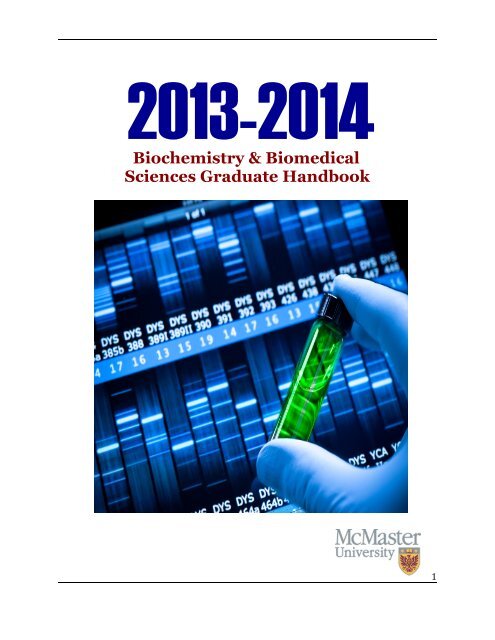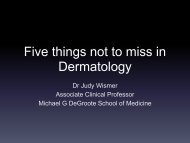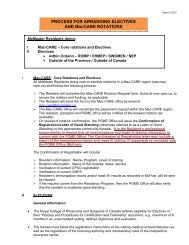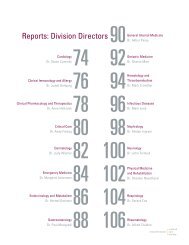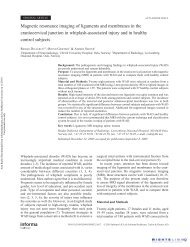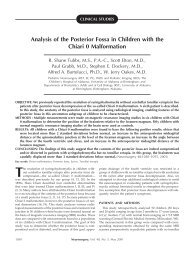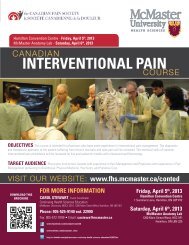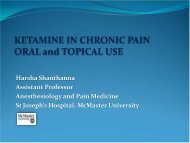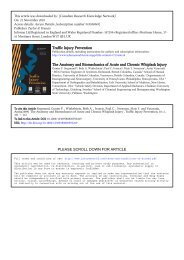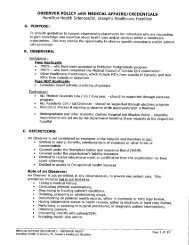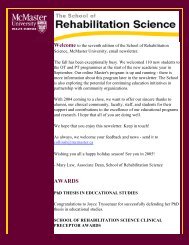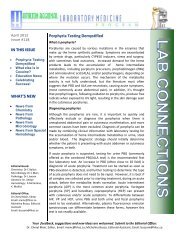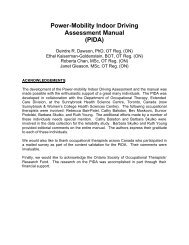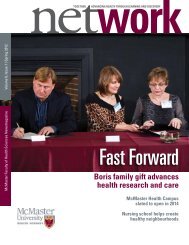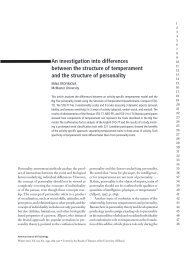Graduate Handbook - Faculty of Health Sciences - McMaster ...
Graduate Handbook - Faculty of Health Sciences - McMaster ...
Graduate Handbook - Faculty of Health Sciences - McMaster ...
Create successful ePaper yourself
Turn your PDF publications into a flip-book with our unique Google optimized e-Paper software.
2013-2014<br />
Biochemistry & Biomedical<br />
<strong>Sciences</strong> <strong>Graduate</strong> <strong>Handbook</strong><br />
<br />
1
This document is not intended to replicate or modify the information found<br />
in the School <strong>of</strong> <strong>Graduate</strong> Studies (SGS) Calendar available at<br />
http://graduate.mcmaster.ca/graduate-calendar.<br />
If there is any discrepancy between this document and the SGS Calendar, then the School <strong>of</strong> <strong>Graduate</strong><br />
Studies Calendar shall prevail. Students and faculty are encouraged to look at the SGS Calendar for<br />
information about:<br />
<strong>Graduate</strong> study at <strong>McMaster</strong>;<br />
General regulations <strong>of</strong> the School <strong>of</strong> <strong>Graduate</strong> Studies;<br />
University regulations;<br />
<strong>Graduate</strong> fees and financial assistance;<br />
University regulations affecting graduate students;<br />
University services;<br />
Fellowships, scholarships, bursaries and other awards;<br />
University governing bodies;<br />
Student appeals; and<br />
Degree programs (including degree requirements).<br />
2013-2014 GRADUATE CALENDAR & SESSIONAL DATES<br />
http://digitalcommons.mcmaster.ca/sgs_cal/15/<br />
SCHOOL OF GRADUATE STUDIES<br />
http://graduate.mcmaster.ca/current-students<br />
ACADEMIC INTEGRITY<br />
http://www.mcmaster.ca/academicintegrity/ <br />
<br />
2
TABLE OF CONTENTS<br />
Sessional Dates....................................................................................................................4<br />
Important Dates ....................................................................................................................5<br />
Registration...........................................................................................................................6<br />
Validation Stickers ................................................................................................................6<br />
<strong>Graduate</strong> E-mail....................................................................................................................6<br />
Academic Record .................................................................................................................6<br />
Student Wellness Centre ......................................................................................................6<br />
Biochemrocks .......................................................................................................................7<br />
Laboratory Safety Training ..................................................................................................7<br />
Payroll Information................................................................................................................8<br />
<strong>Health</strong> & Dental Plans...........................................................................................................9<br />
Teaching Assistantships .....................................................................................................11<br />
Course Requirements .......................................................................................................12<br />
Course Offerings.................................................................................................................13<br />
Seminars ...........................................................................................................................14<br />
Supervisory Committee Meetings.......................................................................................14<br />
MSc Requirements .............................................................................................................17<br />
MSc Thesis Evaluation ......................................................................................................17<br />
Transfer Examination..........................................................................................................18<br />
PhD Requirements ...........................................................................................................20<br />
Qualification Examination ...................................................................................................20<br />
PhD Comprehensive Examination .....................................................................................21<br />
PhD Thesis Evaluation ......................................................................................................21<br />
Thesis Submission..............................................................................................................22<br />
Combined MD/PhD.............................................................................................................22<br />
Astrobiology ........................................................................................................................22<br />
Department Awards ............................................................................................................23<br />
External Awards..................................................................................................................25<br />
Biochemistry Safety Training Documentation.....................................................................26<br />
<br />
3
Sessional Dates <br />
SESSIONAL DATES 2013-‐2014 <br />
FALL TERM (1) <br />
WINTER TERM (2) <br />
SUMMER TERM (S) <br />
DEADLINE DATES FOR GRADUATE <br />
w & x Sept. – Dec., 2013 y & z Jan. – April, 2014 <br />
PROGRAMS (EXCEPT MBA – SEE BELOW) <br />
w Sept. – Oct., 2013 y Jan. – Feb., 2014 <br />
May – August, 2014 <br />
x Nov. – Dec., 2013 z March – April, 2014 <br />
On-‐Time Registration <br />
Thursday, July 11 to Thursday, December 5 to Thursday, April 10 to <br />
Friday, August 2 Thursday, December 19 Thursday, April 24 <br />
Class Start Dates * <br />
Classes begin after Classes begin after Class start dates vary – <br />
September 4, 2013 – January 5, 2014 – check check with program for <br />
check with program for with program for details <br />
details <br />
details <br />
Late Registration <br />
Saturday, August 3 to Friday, December 20 to Friday, April 25 to <br />
Monday, September 9 Monday, January 6 Monday, May 5 <br />
Final Dates to Add Courses: <br />
Full Courses <br />
Friday, September 27 <br />
Half Courses or Quarter Courses (1w or 2y) Friday, September 27 Friday, January 24 Friday, May 23 <br />
Quarter Courses (1x or 2z) Friday, November 1 Friday, March 7 <br />
Final Dates to Drop Courses: ** <br />
Full Courses <br />
Friday, January 10 <br />
Half Courses Friday, October 11 Friday, February 7 Friday, June 13 <br />
Quarter Courses (1w or 2y) Friday, September 27 Friday, January 24 <br />
Quarter Courses (1x or 2z) Friday, November 8 Friday, March 14 <br />
Final Dates to Submit Grades: <br />
Full Courses <br />
Sunday, May 4 <br />
Half Courses Monday, January 6 Sunday, May 4 Friday, August 29 <br />
Quarter Courses (1w or 2y) Friday, November 1 Friday, March 7 <br />
Quarter Courses (1x or 2z) Monday, January 6 Sunday, May 4 <br />
Final Date to Submit Results <strong>of</strong> Incomplete <br />
(INC) Grades for Previous Term with <br />
Friday, March 14 Friday, July 11 Friday, November 14 <br />
Permission <strong>of</strong> Associate Dean <br />
THESES FALL 2013 SPRING 2014 FALL 2014 <br />
Final Date to Submit Ph.D. Theses to <br />
Friday, July 19 Tuesday, Feb. 4 (<strong>Health</strong> Friday, July 18 <br />
<strong>Graduate</strong> Studies (Prior to Defense) <br />
Sci.) <br />
Tuesday, Feb. 25(All others) <br />
Final Date to Submit Master’s Theses to <br />
Friday, August 16 Friday, March 14 Friday, August 15 <br />
Departments (Prior to Defense) <br />
Final Date to File Theses with <strong>Graduate</strong> <br />
Studies and Complete Degree Requirements <br />
-‐ <strong>Faculty</strong> <strong>of</strong> <strong>Health</strong> <strong>Sciences</strong> <br />
-‐ All Other Faculties <br />
Wednesday, Sept. 25 <br />
Wednesday, Sept. 25 <br />
Wed., April 2(except <br />
Nursing) <br />
Wednesday, April 23 <br />
(including Nursing) <br />
Wednesday, Sept. 24 <br />
Wednesday, Sept. 24 <br />
* There is no <strong>of</strong>ficial fall break or reading week for graduate students (except MBA). Students should check with their program and their <br />
course instructor(s) as to whether classes will be held during these periods. Please see sections 1.3 (Responsibilities <strong>of</strong> <strong>Graduate</strong> Students <br />
to the University) and 2.4.6 (Vacations) <strong>of</strong> the calendar for more information.<br />
** All courses on a student’s record after these dates will require a grade. Exceptions require submission <strong>of</strong> a Petition for Special <br />
Consideration<br />
<strong>McMaster</strong> University School <strong>of</strong> <strong>Graduate</strong> Studies Calendar 2013-‐2014 <br />
Page xvii
IMPORTANT DATES<br />
Tues, Sept. 3 10:00 - 1:30<br />
HSC-1A5<br />
WHMIS Laboratory and Fire Safety Training –<br />
Mandatory for New Students. All other quizzes must be<br />
completed no later than September 30 (see page 7 for<br />
more information)<br />
Friday, Sept. 6<br />
2:00 pm<br />
HSC-4E20<br />
<strong>Graduate</strong> Student Orientation – Mandatory for New Students<br />
To begin the new academic year, a meeting with our Assistant<br />
Chair <strong>of</strong> <strong>Graduate</strong> Studies, Dr. Brian Coombes.<br />
Mon, Sept. 9 10:00 - 11:30<br />
HSC-2J3A<br />
<strong>Health</strong> <strong>Sciences</strong> Photo ID Badge<br />
All students are required to wear a <strong>McMaster</strong> <strong>Health</strong> <strong>Sciences</strong><br />
Centre photo identification badge for security purposes.<br />
TBA<br />
12 – 1:30 pm<br />
Esplanade<br />
Come join us for our annual department welcome BBQ.<br />
AWARDS<br />
BBS Travel Awards<br />
OGS<br />
NSERC<br />
CIHR (Doctoral)<br />
CIHR (Masters)<br />
Department Deadline: Sept. 27<br />
Department Deadline: TBA<br />
Department Deadline: TBA<br />
Directly to CIHR: Oct. 1<br />
Department Deadline: TBA<br />
SGS 101# (Mandatory Ethics Course) – On-line training available Sept. 13, 2013<br />
All graduate students are required to complete the Academic Integrity/Research Ethics course<br />
<strong>of</strong>fered by the School <strong>of</strong> <strong>Graduate</strong> Studies as part <strong>of</strong> their degree requirements. Students may<br />
not graduate or register for subsequent years unless they have received a passing grade.<br />
Please register on SOLAR - subject code is SGS; course code 101#. To access the course<br />
material, visit "Avenue to Learn" at: http://avenue.mcmaster.ca/ and click on the “<strong>McMaster</strong> e-<br />
learning” button. Your student MacID and password are required to access "Avenue to Learn".<br />
SGS 201# (Mandatory AODA Training) – On-line training available Sept.13, 2013<br />
The Ontario government has enacted a Customer Service regulation <strong>of</strong> the Accessibility for<br />
Ontarians with Disabilities Act, which came into effect with the start <strong>of</strong> 2010. Senate passed the<br />
requirement for all graduate students to complete this training. Please register on SOLAR -<br />
subject code is SGS; course code 201#. Students may not graduate or register for subsequent<br />
years unless they received a pass grade. The course content is <strong>of</strong>fered by Accessibility at<br />
<strong>McMaster</strong> through: http://www.mcmaster.ca/accessibility/<br />
<br />
5
REGISTRATION<br />
Registration and Course Selection Guideline<br />
http://graduate.mcmaster.ca/current-students/registration<br />
All new and returning graduate students are required to register on SOLAR annually for the forthcoming<br />
academic session. A MacID and password is required in order to access SOLAR. NOTE: Students<br />
who fail to register during the on-time registration period will be charged a $50 late fee. <br />
VALIDATION STICKERS<br />
Validation stickers identify your academic classification and should be attached immediately to your<br />
student card to avoid theft. Your confirmation letter and sticker can be picked up from our Department<br />
<strong>Graduate</strong> Assistant on August 29 if your registration has been successfully confirmed and your payment<br />
agreement is cleared by Student Accounts. The validation sticker displays various University services<br />
available. Simply flash your regular student ID card when boarding any Hamilton Street Railway bus and<br />
enjoy travelling around the Hamilton community. You also will have access to the athletics and recreation<br />
facilities located in the David Braley Athletic Centre. NOTE: Access to The Pulse Fitness Centre is<br />
available with an additional fee (see http://www.marauders.ca/). Students who register late or fail to<br />
complete their academic registration and payment agreement on-time must visit the School <strong>of</strong> <strong>Graduate</strong><br />
Studies (Gilmour Hall, room 212) in person during the first week <strong>of</strong> September.<br />
GRADUATE E-MAIL ADDRESS<br />
The School <strong>of</strong> <strong>Graduate</strong> Studies and the Department uses electronic mail to communicate directly with<br />
graduate students at various times throughout the year. University Technology Services provides every<br />
student with an email address. To activate, go to https://adweb.cis.mcmaster.ca/cis/ahtml/login.htm and<br />
click on the “Email by Google” tab. *It is important to inform the BBS <strong>Graduate</strong> Assistant ASAP<br />
when you receive your MAC address.<br />
ACADEMIC RECORD<br />
MUGSI Login: https://adweb.cis.mcmaster.ca/cis/ahtml/login.htm<br />
<strong>McMaster</strong> University Gateway to Student Information (MUGSI) is an online service allowing students to<br />
access their academic, financial and personal information. With a valid MAC ID, students can use<br />
MUGSI to: view grade reports, check personal timetables, view account statements, change personal<br />
information, view and maintain academic information and view links to various University services such as<br />
e-mail, libraries and the Registrar’s <strong>of</strong>fice. Please take the time to check your academic record on<br />
MUGSI. There are registration deadlines to drop and add courses in each term. Students registering in,<br />
or adding a course after the appropriate deadline will not receive academic credit for that course.<br />
Students dropping a course after the deadline will receive a failing grade in that course. As you have<br />
access to your record on MUGSI, it is important to check your record to ensure changes to your record<br />
during the year are accurately reflected on the system. If you notice any discrepancies, please notify the<br />
department as soon as possible. It is your responsibility to initiate and follow through on dropping<br />
and/or adding courses. Informing the course instructor is not sufficient enough!<br />
STUDENT WELLNESS CENTRE<br />
The Student Wellness Centre provides services to full and part-time graduate students that will enhance<br />
your personal and academic success. Staffed by highly qualified service providers with a special interest<br />
in university students, they provide student-centered, accessible, confidential and caring services for you.<br />
The Centre is located in the <strong>McMaster</strong> University Student Centre, Room B101. For more information go<br />
to: http://wellness.mcmaster.ca/<br />
<br />
6
BIOCHEM ROCKS has <strong>of</strong>ficially been launched on Facebook!<br />
This is a great opportunity for the members <strong>of</strong> our department to share ideas and connect with the rest <strong>of</strong><br />
<strong>McMaster</strong> community. Please take time to visit our site, post comments and share your contributions.<br />
http://www.facebook.com/macbiochemrocks<br />
COMMENTS BOX: (Black cupboard, bottom slot, beside room 4H39)<br />
In an effort to improve communication about graduate student issues, we will be hosting a "Comments<br />
Box" where graduate students can bring ideas, suggestions or any issue <strong>of</strong> concern to the attention <strong>of</strong> the<br />
Associate Chair, <strong>Graduate</strong> Education. Comments are confidential; however if specific follow-up is<br />
required please provide contact information where you can be reached. All comments will be read in<br />
confidence and will be given the full consideration <strong>of</strong> the Associate Chair and other members <strong>of</strong> the<br />
<strong>Graduate</strong> Curriculum Committee as necessary.<br />
LABORATORY SAFETY TRAINING<br />
Every employee <strong>of</strong> <strong>McMaster</strong> University must participate in basic safety training sessions as they relate to<br />
their work environment. All new graduate students are required to attend the full “Technical WHMIS”,<br />
“Fire” and “Biosafety (if applicable)” orientation within their first month <strong>of</strong> employment. The “Training<br />
Documentation” form (Appendix A) is to be signed by the session leader and returned to your lab<br />
representative. The FHSc Safety Office requires annual Fire Safety, Laboratory WHMIS and Biosafety<br />
training updates.<br />
REQUIRED LAB SAFETY TRAINING<br />
http://fhs.mcmaster.ca/safety<strong>of</strong>fice/lab_safety_training.html<br />
• Fire safety (online followed by a quiz)<br />
• Laboratory WHMIS (in-class followed by a quiz)<br />
• Biosafety Training (in-class followed by a quiz)<br />
• Initial training and quiz required followed by an annual update<br />
http://cll.mcmaster.ca/eohss/<br />
• <strong>Health</strong> & Safety Orientation<br />
• Asbestos Awareness<br />
• Chemical Handling and Spills<br />
• Ergonomics<br />
• Slips, Trips and Falls<br />
• Office WHMIS<br />
• Training and quiz required only once<br />
REQUIRED AWARENESS TRAINING<br />
Violence and Harassment Program: http://mcmaster.ca/accessibility/<br />
OTHER SAFETY RELATED FORMS<br />
Working Alone Policy: A person working in the lab outside <strong>of</strong> regular hours (8:30-5pm) must read and<br />
sign their lab’s working alone policy. Please contact your lab safety rep or supervisor for more<br />
information.<br />
<br />
7
Job Hazard Analysis: All employees (post-docs, technicians, casual and summer employment) working<br />
in a lab setting must complete a JHA form. The JHA must be completed between the employee and their<br />
supervisor and mailed to EOHSS. A copy must be submitted to Jodi Biro in the main <strong>of</strong>fice (HSC-4N59).<br />
JHA instructions and login: http://www.mcmaster.ca/workwell/<br />
Additional training may be required based on your duties (autoclave, CAF orientation, radio-isotopes,<br />
TDG, etc.) and lab site-specific training (centrifuge, fermenter, French press, etc.). Please see your lab<br />
safety rep or supervisor.<br />
PAYROLL INFORMATION<br />
(http://graduate.mcmaster.ca/payment-services/payroll-information)<br />
Stipend: A minimum stipend is approved each year by our Department Chair. The 2013-2014 support<br />
for MSc students is $20,300.00/year and $23,500.00/year for PhD students. Students can expect<br />
minimum support from their supervisors for either two years (MSc students) or four years (PhD students).<br />
There is no guarantee <strong>of</strong> financial support after these respective periods. Salaries <strong>of</strong> students who<br />
hold external or internal scholarships will be adjusted according to our Department ”<strong>Graduate</strong> Stipend<br />
Rates” listed on our website: http://www.fhs.mcmaster.ca/biochem/graduate/financial.html.<br />
Direct Deposit – IS MANDATORY<br />
Monthly pays will be deposited directly into your bank account. A monthly "Statement <strong>of</strong> Earnings" slip<br />
showing details <strong>of</strong> your payment will be inserted into your lab mailbox located in HSC-4N59. It is<br />
imperative you complete the Employee Deposit Information form available on the School <strong>of</strong> <strong>Graduate</strong><br />
Studies website, attach a void cheque and mail to the School <strong>of</strong> <strong>Graduate</strong> Studies (GH-212) upon your<br />
arrival. Please arrange this immediately as failure to do so may result in considerable delay in receiving<br />
your pay.<br />
Payday: Payday for graduate students is the last Thursday <strong>of</strong> every month, except December’s pay<br />
will be deposited on the 12 th . All teaching assistantship and scholarship support is dependent upon<br />
continuous full-time registration in good standing.<br />
CALCULATION OF MONTHLY PAYMENTS - Please read carefully<br />
All employment income (TA and/or RA in lieu <strong>of</strong> TA) you are to receive will be paid to you when the work<br />
is scheduled to be done, normally from September to April. External scholarships (ie. NSERC, SSHRC,<br />
OGS, CIHR Masters) will be paid out one twelfth per month. Department, <strong>Graduate</strong> and Research<br />
scholarships will be paid out in such a way that you will receive approximately equal monthly payments<br />
over the academic year (September - August). Entrance scholarships will be paid out monthly over the<br />
first term. Tuition Bursary payments will be paid out according to how the tuition is to be deducted (ie.<br />
Tuition deducted over 8 months - bursary will be paid over 8 months, tuition deducted over 12 months -<br />
bursary will be paid out over 12 months). Incidental Fees ($821.88) and UHIP for Visa Students ($684)<br />
will ALL be deducted in September. Please Note: If you are receiving department and/or graduate<br />
and/or research monies during the academic year, we will attempt to pay you a larger amount in<br />
September (or the first month you receive payment) to accommodate the Incidental Fees.<br />
Social Insurance Number (SIN): Students employed as Teaching Assistants require a Social Insurance<br />
Number. This is a nine-digit number required by law as an administrative number for authorized federal<br />
programs, notably Employment Insurance, Canada Pension Plan and Income Tax. A SIN card is<br />
compulsory in Canada to receive government benefits. Please refer to the following website to find a<br />
Service Canada Centre near you and to obtain other information you require before you apply:<br />
http://www.servicecanada.gc.ca./eng/sc/sin. Required documents: passport, study permit, and a letter<br />
confirming employment (see Lorraine Curtis, Operations Manager, HSC-4N59).<br />
<br />
8
Personal Tax Credits Return: TD1 and TD10N<br />
The university will be issuing the following tax documents during the month <strong>of</strong> February. There will be a<br />
fee and delay (after April) for replacement copes.<br />
• T-4 Slips (Employment Income)<br />
• T-4a Slips (Scholarship Income)<br />
• T-2202a Certificates will be available for students to download on MUGSI (Tuition, Education and<br />
Textbook Amounts Certificate). This is the <strong>of</strong>ficial receipt for tuition fees, the number <strong>of</strong> months <strong>of</strong><br />
full time or part time study, eligible textbook amounts and the designation <strong>of</strong> amounts that may be<br />
eligible to transfer to a qualifying individual. MUGSI provides you with a print option <strong>of</strong> this receipt<br />
but you are not required to submit printed confirmation with your income tax return, unless<br />
specifically requested by the Canada Revenue Agency. For more information on processing your<br />
income tax return, refer to the Canada Revenue Agency Student Guidelines . <strong>Graduate</strong><br />
Students who have questions regarding their T2202As should direct inquiries to: The School <strong>of</strong><br />
<strong>Graduate</strong> Studies in GH 212 (905) 525 9140 Ext 23685<br />
NOTE: T4 and T4a slips will be mailed directly to your mailing/local address, alternatively if no mailing<br />
address is recorded in your record, the slips will be mailed to your permanent address. Changes to your<br />
home address must be made through MUGSI no later than January 1, 2014. This is your responsibility!<br />
Tuition Discount:<br />
Doctoral students in term 13 or greater are automatically eligible for discounted tuition. Masters students<br />
are not eligible for discounted tuition and will continue to pay regular fees through to completion. Masters<br />
students who are overtime (term 7 or greater) have the option to select the overtime payment plan where<br />
they pay tuition for the fall term and give a post-dated cheque for the remainder <strong>of</strong> the academic year<br />
(January to August). If they defend in the fall, the post-dated cheque will not be cashed.<br />
HEALTH & DENTAL PLANS<br />
All questions concerning health and dental benefits should first be directed to the <strong>Graduate</strong> Students<br />
Association information website: http://www.ihaveaplan.ca/rte/en/<strong>McMaster</strong>University_Home. If further<br />
assistance is still required, then please contact macgsa@mcmaster.ca<br />
<strong>Health</strong> Insurance (OHIP): The <strong>Graduate</strong> Student Association (GSA) <strong>Health</strong> Plan was designed to<br />
provide many important services and cover expenses not covered by your basic health-care plan (i.e.<br />
OHIP or UHIP), such as prescription drugs, travel health coverage, physiotherapy, medical equipment<br />
and more. <strong>Graduate</strong> students are charged an annual premium for a group health plan underwritten by<br />
Sun Life Assurance Company <strong>of</strong> Canada. All full-time and part-time graduate students who are GSA<br />
members and who pay GSA and <strong>McMaster</strong> fees are automatically enrolled in the plan. Coverage starts<br />
once you are fully registered with <strong>Graduate</strong> Studies.<br />
<strong>Health</strong> Insurance (International Students): VISA STUDENTS are required to obtain health coverage<br />
under the UNIVERSITY HEALTH INSURANCE PLAN (UHIP). Students with sufficient University funding<br />
will have their UHIP premium (student single coverage only) deducted from payroll in their September<br />
pay. After successfully registering, students may pick up their UHIP card from the International Students'<br />
Office located in Gilmour Hall, Room 104. For more information:<br />
http://oisa.mcmaster.ca/handbook%5Chealth_care.cfm <br />
How Much Does it Cost? <br />
The health insurance fee for full-year coverage (Sept. 1, 2013 - Aug. 31, 2014) is $182.00 for GSA<br />
members. The cost <strong>of</strong> the Plan is part <strong>of</strong> your student incidental fees.<br />
<br />
9
Prescriptions - Pay Direct Card: Your <strong>Health</strong> Plan will cover eligible prescription drug costs up to 80%.<br />
The plan covers most medications legally requiring a prescription. The plan covers oral contraceptives<br />
and contraceptive devices. Smoking cessation devices are covered at 80%, to a maximum <strong>of</strong> $500 per<br />
policy year. This includes non-prescription smoking cessation devices, when accompanied by a detailed<br />
receipt. Charges in excess <strong>of</strong> the lowest priced equivalent generic product are not covered. The GSA<br />
<strong>Health</strong> Plan only covers those medications listed in the National Formulary. In the event that the drugs<br />
covered by the National Formulary are not effective in treating the condition, an exception process is in<br />
place.<br />
Pay Direct Card: By presenting the Pay Direct Card with your valid student ID card, you can fill your<br />
prescriptions at most Canadian pharmacies. The pharmacist can process your claim immediately, so you<br />
won’t have to pay the full amount up front and wait to be reimbursed.<br />
http://www.ihaveaplan.ca/rte/en/<strong>McMaster</strong>University_DownloadCentre_PayDirectCard<br />
For more information (“Download Centre”): www.ihaveaplan.ca. Use these forms to submit your health<br />
claims to the insurance company. Claim forms can also be picked up at the GSA <strong>of</strong>fice. Please allow<br />
one to two weeks for your claim to be processed. Where to Send <strong>Health</strong> Claims: Sun Life Assurance<br />
Company <strong>of</strong> Canada, PO Box 11805 Stn. Centre-Ville, Montreal, QC H3C 0H3<br />
Travel <strong>Health</strong> Coverage: Travel health benefits cover hospital, physician and other services (with some<br />
exceptions) for emergency treatment <strong>of</strong> an injury or illness while traveling outside <strong>of</strong> the province in which<br />
you are residing. If you're planning to travel, please visit www.ihaveaplan.ca “Download Centre” for more<br />
information.<br />
*Blackout Period (for new students only): Processing claims are delayed for new students during the<br />
first two months <strong>of</strong> the Fall and Winter semesters while studentcare.net waits for complete enrolment lists<br />
and opt outs have been processed. During this time, you many submit claims, but reimbursement<br />
cheques will only be mailed once the Blackout Period ends. Pharmacists cannot accept Pay Direct<br />
during the Blackout Period.<br />
Dental Coverage Basic Eligibility Criteria: All full-time and part-time graduate students enrolled in<br />
September or January who are GSA members and pay GSA and <strong>McMaster</strong> fees will automatically be<br />
enrolled in the Dental Plan. This includes International Students studying at <strong>McMaster</strong> and paying<br />
<strong>McMaster</strong> fees, as well as students away on exchange.<br />
CUPE Dental Coverage (Teaching Assistants): CUPE 3906 provides dental coverage for Unit 1<br />
members who have a TA or RA in lieu <strong>of</strong> TA. Students will be opted-out <strong>of</strong> the GSA plan automatically on<br />
September 30. Regardless <strong>of</strong> what is listed on your schedule <strong>of</strong> fees – YOU WILL NOT BE CHARGED<br />
for the GSA plan. To qualify you must have a TA contract for 130 hours in the current academic year.<br />
For help determining which plan you are enrolled in and/or for general dental inquiries, please contact<br />
either: GSA: http://gsa.mcmaster.ca/contact-us or<br />
CUPE: http://www.cupe3906.org/wordpress/about/contact <br />
Opting Out: A student can opt-out <strong>of</strong> their plan if they have equivalent coverage. When opting out, be<br />
sure to complete the forms for the correct dental plan. You must provide pro<strong>of</strong> <strong>of</strong> equivalent coverage<br />
with your own name on it in order to opt-out successfully.<br />
GSA (before Sept. 25, 2013): www.ihaveaplan.ca<br />
CUPE 3906 (early September): www.cupe3906.org (Forms are available in the CUPE <strong>of</strong>fice or online.<br />
Opt-out forms must be submitted in person to the CUPE <strong>of</strong>fice by the deadlines stipulated on the form.)<br />
<br />
10
TEACHING ASSISTANTS<br />
The Centre for Leadership in Learning helps anyone involved in teaching at <strong>McMaster</strong>. As a Teaching<br />
Assistant you may just be getting started in your teaching journey or want to further develop your skills as<br />
a teaching assistant. A number <strong>of</strong> resources are available to assist you on their website<br />
http://cll.mcmaster.ca/. Alternatively, if you wish to speak to someone directly, you can call ext. 24540 or<br />
email gradnet@mcmaster.ca.<br />
Appointments: Each year our program receives an allocation <strong>of</strong> Teaching Assistantships. PhD students<br />
will continue to TA, while it is not mandatory for MSc students. An application-based process for TA<br />
allocation to PhD students will be implemented. If we do not fill all <strong>of</strong> our TA positions with our in time<br />
PhD students, then MSc students will be invited to apply for the remaining positions.<br />
Canadian Union <strong>of</strong> Public Employees: If you have been <strong>of</strong>fered a Teaching Assistantship, you will<br />
become an employee <strong>of</strong> <strong>McMaster</strong> University in addition to being a graduate student. The terms and<br />
conditions <strong>of</strong> your employment are governed by the collective agreement between the Canadian Union <strong>of</strong><br />
Public Employees, Local 3906 Unit 1 and the University.<br />
http://www.cupe3906.org/wordpress/about/collective-agreements<br />
Continuity <strong>of</strong> Funding: Every regular full-time student, in a Master's program, who has been<br />
employed as a Teaching Assistant during a part <strong>of</strong> the first year <strong>of</strong> study in a program will be re-employed<br />
as an assistant during a part <strong>of</strong> the one succeeding year <strong>of</strong> study subject to his/her maintaining regular<br />
full-time graduate status and to his/her ability to perform the work. Full-time students, in a Doctoral<br />
program, who have been employed as a Teaching Assistant during a part <strong>of</strong> the first year <strong>of</strong> study in a<br />
program will be re-employed as an assistant during a part <strong>of</strong> each <strong>of</strong> the three succeeding years <strong>of</strong> study,<br />
subject to his/her maintaining regular full-time graduate status and to his/her ability to perform the work.<br />
Hours <strong>of</strong> Work Form: A meeting between the Course Instructor and Teaching Assistant must be held<br />
within 7 days <strong>of</strong> the TA commencing his/her duties in the applicable academic term. At this meeting, the<br />
employment supervisor will describe the work to be done, giving details, including the nature, number <strong>of</strong><br />
scheduling <strong>of</strong> specific assignments and the estimated hours <strong>of</strong> work each will involve. The employee and<br />
supervisor will discuss this information, taking into account course enrollment, nature <strong>of</strong> assignments and<br />
expectations for grading and determining reasonable workload. Following this discussion, the<br />
"TEACHING ASSISTANT HOURS OF WORK ASSIGNMENT" form must be completed and signed by<br />
both parties and returned for the Chair’s signature. All TAs must fill in their completed <strong>Health</strong> and Safety<br />
Training dates in addition to signing a Job Hazard Analysis Summary Form.<br />
Wages: Employees who sign a Teaching Assistant Contract shall be paid their wages in equal monthly<br />
installments over the term <strong>of</strong> their Teaching Assistant contract. The 2013 hourly rate for employees<br />
holding a 4-year undergraduate degree is $40.20. This rate includes 4% vacation pay. Plus 3 additional<br />
hours per term will be allocated solely for the purpose <strong>of</strong> participating/fulfilling safety training<br />
requirements. Please note tuition, taxes, CPP, EI, UHIP (if required), dental (if eligible) etc., will be<br />
deducted from your teaching assistantship income.<br />
Exchange or Substitution <strong>of</strong> Duties: An employee may arrange to exchange his/her duties with or by a<br />
qualified person for periods not to exceed ONE week at a time and not to exceed two weeks per term<br />
subject to the approval <strong>of</strong> Dr. Michelle MacDonald (macdonml@mcmaster.ca). Examples <strong>of</strong> such an<br />
arrangement would be for the employee to attend an Academic Conference or to attend to an ill family<br />
member.<br />
Discharge and Discipline: Where appropriate, discipline will be preceded by counseling. Discipline will<br />
typically consist <strong>of</strong> (oral or written) warning(s) and suspension prior to discharge.<br />
<br />
11
Vacations: Students will be allowed a total <strong>of</strong> two (2) week's vacation annually, which may be taken<br />
during the mid-term recess or subsequent to the completion <strong>of</strong> TA duties within an academic term during<br />
which they are employed. Scheduling <strong>of</strong> vacations shall be subject to the academic and residency<br />
requirements <strong>of</strong> the student's program <strong>of</strong> studies and must be approved by the student’s supervisor.<br />
DEPARTMENT COURSE REQUIREMENTS<br />
MSc => Two half graduate courses (at the “700-level”)<br />
PhD => No formal course requirements<br />
In selecting courses, students must consult with their supervisor. At least one full, 700-level graduate<br />
course (or two half courses) must be completed, which must include at least one half, 700-level graduate<br />
course in Biochemistry. Supervisory committees may recommend a student take courses in addition to<br />
those prescribed by departmental regulations. Students may take 600-level courses however these do<br />
not count towards degree requirements. Under normal circumstances a student who fails to obtain B- in a<br />
prescribed course is asked to withdraw from the program. Those allowed to remain in the program must<br />
either repeat or replace the failed course. A failing grade in a prescribed course remains on the transcript.<br />
COURSE SELECTION<br />
It is important to note that students must have the approval <strong>of</strong> their supervisor prior to making their course<br />
selections on SOLAR. Course selection may be completed either at the time <strong>of</strong> registration or at a later<br />
date with reference to the critical deadline dates. *It is important to complete all these steps (add/drop,<br />
verify and apply) as until the final step, courses do not appear on your academic record. Courses are<br />
identified as being in one <strong>of</strong> the three categories: M (Master’s), D (Doctoral) or EC (Extra Course).<br />
To register for courses:<br />
• Log on to SOLAR via MUGSI (the link for SOLAR is under “My academics”)<br />
• Select “GRADUATE REGISTRATION/COURSE SELECTION” for session<br />
• Read the accountability statement and click continue<br />
• Complete course selection by adding and/or dropping courses<br />
• Verify changes<br />
• Apply changes<br />
• Confirmation screen will return with confirmation number<br />
• Print this screen so there is a record <strong>of</strong> course selection<br />
Please contact the course coordinator at the beginning <strong>of</strong> the term regarding dates, times and<br />
location.<br />
Illness During Course Work: If a graduate student is ill or is under a doctor's care prior to an<br />
examination or course deadline, this must be brought to the attention <strong>of</strong> the course instructor at that time.<br />
<br />
12
COURSE OFFERINGS (2013-2014)<br />
The following are general descriptions <strong>of</strong> graduate courses <strong>of</strong>fered by the Department <strong>of</strong> Biochemistry &<br />
Biomedical <strong>Sciences</strong> for 2013-2014. Please contact the course coordinator for dates, times and<br />
location.<br />
TERM 1 — Special Topics in Systems Pharmacology and Chemical Biology – 711*<br />
Instructor: Nathan Magarvey (Sept. – Dec. 2013) - Limited enrollment: 10 students<br />
This course will cover topics <strong>of</strong> current interest in the areas <strong>of</strong> Systems Pharmacology and Chemical<br />
Biology. A particular focus will be placed on the properties <strong>of</strong> drugs and natural chemicals and their<br />
interaction with living systems. Select examples will be discussed on how to probe the mechanism <strong>of</strong><br />
action and global pharmacological properties. Natural products small chemicals will remain a start point<br />
for discussions and learning how best to generate new targeted chemotherapies based on systems<br />
pharmacologic principles.<br />
TERM 1 — Protein Structure Determination – 727*<br />
Instructor: Joaquin Ortega (Sept. – Dec. 2013) - Limited enrollment: 10 students<br />
Most <strong>of</strong> the enzymes both in prokaryotic and eukaryotic cells are multi-component assemblies. Electron<br />
microscopy is a technique uniquely position to study the structure and conformational changes that these<br />
macromolecular assemblies undergo while performing biochemical reactions that sustain life. This course<br />
describes how the structures <strong>of</strong> these macromolecular assemblies are elucidated using cryo-electron<br />
microscopy. The course will discuss methods for specimen preparation, imaging, reconstruction and<br />
validation. The format <strong>of</strong> the course will include some introductory lectures provided by the instructor, as<br />
well as students presentations <strong>of</strong> recent papers related to latest advances in the techniques or describing<br />
recently published high impact structures.<br />
TERM 2 — Special Topics in Membrane Biochemistry – 712*<br />
Instructor: Russell Bishop (Jan. – April 2014) - Limited enrollment: 10 students<br />
The structural biology <strong>of</strong> bacterial cell envelope biogenesis represents one <strong>of</strong> the most important and<br />
challenging problems in membrane biochemistry. Bacterial cell surface molecules provide signatures for<br />
host innate immune receptors that recognize pathogens and trigger the inflammatory response. Inhibiting<br />
production <strong>of</strong> those cell surface molecules that are both unique and essential to bacteria can provide<br />
selective toxicity. Consequently, bacterial cell surface molecules reveal targets for the development <strong>of</strong><br />
anti-inflammatory agents in addition to major classes <strong>of</strong> antibiotics. This course will explore the<br />
structure/function relationships that govern the biosynthesis, export, and assembly <strong>of</strong> key bacterial cell<br />
surface molecules, including those <strong>of</strong> their receptors and downstream effectors in higher organisms.<br />
TERM 1 - Biochemistry Colloquium – 720*<br />
Instructor: Brian Coombes (Sept 2013 – April 2014)<br />
Limited to Biochemistry students enrolled in their second year <strong>of</strong> our Master’s program.<br />
The aim <strong>of</strong> this course is a detailed examination <strong>of</strong> the student's own area <strong>of</strong> research. Students will<br />
prepare a review article describing the current state <strong>of</strong> their field in the format employed by the journal<br />
"Trends in Biochemical <strong>Sciences</strong>". In addition to this, students will give a seminar on their research,<br />
including necessary background information in the course <strong>of</strong> the Departmental Seminar Series. Following<br />
that, the student will answer questions from selected faculty members.<br />
<br />
13
TERM 2 — Stem Cell and Regenerative Medicine – 731*<br />
Instructors: Jon Draper, Kristin Hope and Brad Doble (Jan – April 2014)<br />
Limited enrollment: 10 students<br />
Stem cells hold immense experimental potential as model systems for human disease and development<br />
that are difficult to ascertain in cell lines or in the mouse. Arguable, the most impactful role <strong>of</strong> human stem<br />
cells is for tissue repair that becomes damaged from disease or injury, examples included diabetes and<br />
spinal cord injury. This utility <strong>of</strong> stem cells is heavily seeded in new approaches to the clinical called<br />
"regenerative medicine". However, there are many stem cell types that may be specific to certain<br />
applications, new technologies involved with stem cell delivery and differentiation that require elucidation<br />
before these stem cell based replacement therapies can be robustly brought to the bedside. The<br />
underlying biology that defines stem cells, and their potential applications to human health will be<br />
discussed broadly to better define the current successes and future limitations <strong>of</strong> regenerative medicine<br />
using human stem cells.<br />
SEMINARS – Mondays (11:30-12:30)<br />
Participation in the departmental seminar program is mandatory for all graduate students: learning to<br />
communicate the results <strong>of</strong> basic research is an integral part <strong>of</strong> graduate education. It is also important for<br />
students to be exposed to research outside their own area <strong>of</strong> specialization. Students are therefore<br />
expected to attend their colleagues seminars as well as present their own. MSc and PhD students are<br />
required to present one and two seminars respectively.<br />
MSc Seminar: Master’s students will present a 15-minute seminar (with 5 minutes set aside for questions<br />
from the audience) during our Monday seminar series. This should be a very focused presentation. The<br />
problem the student is trying to address should be explained in such a way that any scientifically literate<br />
audience member can grasp what they’re working on.<br />
PhD Seminars: The first doctoral level seminar is given concomitantly with the student’s comprehensive<br />
examination and the second seminar is typically during the last 12 months in the program. The student<br />
has 45-50 minutes to present reserving 15 minutes for questions from the audience. Seminars must<br />
place the student’s sizable body <strong>of</strong> work in the context <strong>of</strong> their field. It is important to explain how the<br />
specific work contributes to this field. Students will receive feedback from faculty and other graduate<br />
students following each seminar.<br />
SUPERVISORY COMMITTEE MEETINGS<br />
University regulations require all graduate students meet formally with their supervisory committee to<br />
discuss their progress. Committee meetings provide a tool for both communicating and documenting<br />
students’ accomplishments and their supervisory committees’ expectations. <strong>Graduate</strong> students are<br />
encouraged to familiarize themselves with the <strong>McMaster</strong> University <strong>Graduate</strong> work Supervision<br />
Guidelines for <strong>Faculty</strong> and Students available on the School <strong>of</strong> <strong>Graduate</strong> Studies website:<br />
http://graduate.mcmaster.ca/current-students/student-responsibilities.<br />
Supervisors are responsible for assembling their student’s committee members. The research interests <strong>of</strong><br />
all committee members will encompass the thesis topic <strong>of</strong> the student. The committee will consist <strong>of</strong> the<br />
student's supervisor plus two other members (at least one other must be a full-time faculty or associate<br />
member from the Biochemistry and Biomedical <strong>Sciences</strong> Department). A third member, whose scholarly<br />
interests include the area <strong>of</strong> the student’s main interest, may be from outside the department.<br />
<br />
14
All original supervisory committee forms are submitted to the School <strong>of</strong> <strong>Graduate</strong> Studies and a copy is<br />
kept on file in the department student records. Your form will be emailed to you and/or your supervisor<br />
approximately one week before your meeting. It is your responsibility to ensure your supervisor<br />
completes, discusses and returns all forms to the <strong>Graduate</strong> Assistant (HSC-4H21A) as soon as possible<br />
for processing.<br />
Students will be assigned one <strong>of</strong> four grades by each <strong>of</strong> their committee members: “excellent”,<br />
“satisfactory”, “marginal” or “unsatisfactory”. If marginal or unsatisfactory is given by any one member,<br />
another committee meeting must be held within 3 months to re-assess your progress. If all committee<br />
members give marginal, the supervisor will confer with our Department Assistant Chair <strong>of</strong> <strong>Graduate</strong><br />
Education to decide what further course <strong>of</strong> action to take. The rare instance in which a student receives<br />
two “unsatisfactory” grades will usually lead to expulsion from the program by the School <strong>of</strong> <strong>Graduate</strong><br />
Studies.<br />
GUIDELINES FOR SUPERVISORY COMMITTEE MEETINGS<br />
Students enrolled in our MSc program are to meet every six months with their supervisory committee.<br />
Students enrolled in our PhD program are to meet once a year unless stated otherwise. It is suggested<br />
that each meeting have a specific focus as outlined below.<br />
*First Meeting (4-6 months)<br />
The first supervisory committee meeting is to be held within 4-6 months <strong>of</strong> registration in the graduate<br />
program. The goal <strong>of</strong> this initial meeting is to determine whether the student has a well-defined project<br />
and whether the student is making the necessary effort to become well-versed in the background<br />
literature to their field. We expect all students to attempt to master this material within their first year <strong>of</strong><br />
graduate school. At this first meeting, the student should also have made some basic progress towards<br />
their research goals although it may be <strong>of</strong> a preliminary nature.<br />
*Second Meeting (9-12 months)<br />
The second committee meeting is to be held between 9 and 12 months after arrival in the program. It is<br />
expected the student will have made further progress in digesting literature relevant to their field and to<br />
have made headway in their research.<br />
*Third Meeting (18-20 months)<br />
The third committee meeting will be held no later than 18 months after initial registration in the program.<br />
The purpose <strong>of</strong> this meeting is to decide what the student needs to do to complete their MSc thesis.<br />
Alternatively, if the student has the support <strong>of</strong> their supervisor and committee members, he/she may<br />
obtain permission to take the transfer examination for entry into the PhD program without obtaining a<br />
Masters degree (see page 18).<br />
Subsequent Meetings – PhD<br />
Doctoral students must meet with their committee to review progress at least once a year. However, if<br />
desired or considered necessary by their supervisor, additional meetings may be arranged.<br />
Direct Admission to PhD Program<br />
Students who enter our PhD program directly with a MSc degree are required to schedule their first<br />
Supervisory Committee meeting within FOUR months <strong>of</strong> initial registration. A proposal will be prepared<br />
and defended at a qualification exam following our transfer exam guidelines at approximately NINE<br />
months after initial registration. This meeting will include participation <strong>of</strong> a chair and their committee<br />
members (see page 20).<br />
<br />
15
Committee Report – to be submitted one week prior to your meeting<br />
Students must submit a 10-20 page (double spaced, not including figures) report to their committee that<br />
briefly introduces their project, the work they have done previously (i.e. prior to the previous committee<br />
meeting) and since the last meeting. It is imperative that work completed since the previous meeting be<br />
identified so that the committee can assess the progress that has been made at the bench.<br />
In addition to having sound scientific judgment, nothing is more central to the career <strong>of</strong> a scientist than<br />
being able to clearly explain scientific concepts in writing. We therefore expect our students to master the<br />
art <strong>of</strong> writing scientifically and these reports are part <strong>of</strong> this process: they will serve as important dress<br />
rehearsals for writing papers and theses later on. Any criticisms made <strong>of</strong> meeting reports will be revisited<br />
at subsequent meetings and it is expected that they will have been acted on.<br />
We expect all students to master the literature that is relevant to their project during the first year <strong>of</strong><br />
graduate studies: this includes those papers that make up the foundation <strong>of</strong> their project as well as those<br />
that deal with relevant technical issues. One way <strong>of</strong> assessing progress in this area is the reference list at<br />
the end <strong>of</strong> each report: these should be thorough citations and must be made using one <strong>of</strong> the formats<br />
accepted by journals (see for example http://jb.asm.org/misc/ifora.shtml).<br />
The standards for presentation <strong>of</strong> data in these reports are identical to those in the journals: lanes in gels<br />
must be labeled, strains on plates must be identified, micrographs must be clearly labeled, graphs must<br />
include error bars as appropriate and so on.<br />
The last page or two <strong>of</strong> each report should set out what you expect to achieve in the block <strong>of</strong> time (usually<br />
6 or 12 months) leading up to your next meeting. This does not need to be a detailed description <strong>of</strong> every<br />
technique to be employed, rather the goal is to explain the scientific questions to be addressed and briefly<br />
outline the approach that will be taken.<br />
What happens at committee meetings?<br />
Typically students will come prepared to give a 15-20 minute presentation based on what they have<br />
described in their meeting report. The presentation should provide the rationale <strong>of</strong> the project, a<br />
description <strong>of</strong> the experimental approaches being used, an overview <strong>of</strong> progress, ongoing work, and<br />
future directions. The Committee will then discuss the project in detail with the student. Students receive<br />
a grade and specific recommendations in writing following each committee meeting. Students whose<br />
performance is not considered to be up to par will be graded “unsatisfactory” for that meeting. Depending<br />
on the circumstances, two grades <strong>of</strong> unsatisfactory can be grounds for dismissal from the program.<br />
Students should feel free to bring up any issues they would like guidance on. The most common format is<br />
that committee members will interrupt the student as they proceed through their work and ask questions<br />
about anything that is relevant to the topic. This can include challenges on the interpretation <strong>of</strong> data, first<br />
principles, and scientific questions that are relevant to the topic or to planned experiments. Committee<br />
members may ask the student to briefly explain any <strong>of</strong> the references they cite in their report.<br />
Students are asked to bring lab notebooks containing relevant experimental observations to each<br />
meeting. One important aspect <strong>of</strong> the scientific method is the reproducibility <strong>of</strong> each important<br />
observation: typically the most publishable version <strong>of</strong> an experiment will be shown in the meeting report,<br />
however, students must be able to provide evidence that each observation has been made more than<br />
once.<br />
<br />
16
MSc REQUIREMENTS<br />
NOTE: A student whose work is unsatisfactory may at any time be<br />
required to withdraw from the program.<br />
The general requirements for the MSc degree appear under the Regulations for the Master's degree<br />
(Section 3) in the School <strong>of</strong> <strong>Graduate</strong> Studies Calendar. The MSc degree program is typically 18-24<br />
months in length. A candidate is required to spend at least one calendar year in full-‐time study. The<br />
maximum permissible time for completion is limited to THREE years from initial registration in the<br />
program.<br />
The candidate must complete, with at least B- standing, at least one full, 700-level graduate course (or<br />
two half-courses), which must include at least one half, 700-level graduate course in Biochemistry. The<br />
candidate is required to present a thesis in a final oral examination that embodies the results <strong>of</strong> their<br />
original research. All MSc students are required to present one public seminar in the Departmental<br />
seminar program. Meetings <strong>of</strong> the Supervisory Committee, consisting <strong>of</strong> the supervisor and two additional<br />
faculty members, will take place every 6 months.<br />
Not sooner than two terms after initial registration in the Master’s program, students may request to be<br />
reclassified to the PhD program. Students wishing to be transferred to the PhD program prior to the<br />
completion <strong>of</strong> a Master’s degree must successfully pass the Transfer Examination. The candidate must<br />
present requests for transfer to the supervisor and the Supervisory Committee and all must be in<br />
agreement to proceed with the transfer process. Students enrolled in the Master’s program beyond 22<br />
months must complete the degree requirements including the thesis prior to admission to the PhD<br />
program. As such, all students seeking reclassification to the PhD program from the MSc program must<br />
successfully pass the Transfer Examination before going beyond 22 months following registration in the<br />
MSc program. Approval to transfer will be determined at the meeting <strong>of</strong> the Transfer Committee following<br />
the oral defence.<br />
MSc THESIS EVALUATION<br />
Please review information listed on the following website to ensure plans to complete your degree are in<br />
accordance with the School <strong>of</strong> <strong>Graduate</strong> Studies policies. THESIS REGULATIONS: <br />
http://graduate.mcmaster.ca/current-students/completing-your-degree <br />
Permission to write an MSc thesis is typically requested at or after the student’s third supervisory<br />
committee meeting at approximately the 18-month mark from initial registration in the program. Acting on<br />
behalf <strong>of</strong> the chair, the time <strong>of</strong> the defence will be set by the Department’s <strong>Graduate</strong> Assistant<br />
approximately 6-8 weeks before the expected defence date. A copy shall be given to the student’s<br />
supervisor for formal review at this time. Upon approval, ONE hard copy shall be submitted to each<br />
committee member 2-3 weeks in advance <strong>of</strong> the expected date for oral defence.<br />
The candidate will defend their thesis in an oral examination before a committee <strong>of</strong> not fewer than three<br />
members (including the supervisor). The oral thesis defence is an examination <strong>of</strong> a candidate's ability to<br />
defend publicly his or her written work. The student is to present an oral statement about his/her thesis <strong>of</strong><br />
approximately 15 minutes duration (in no case more than 20 minutes). The student should stress the<br />
main points <strong>of</strong> the contribution to knowledge and the principal technical difficulties either <strong>of</strong> an<br />
experimental or theoretical nature that he/she has overcome. Notes or other aids may be used<br />
<br />
17
ut the statement may not be read from a prepared script. Individual examiners will question the<br />
candidate according to the order established by the Chair (typically the student’s supervisor). After a<br />
successful defence, the Chair <strong>of</strong> the examination committee will inform the student <strong>of</strong> thesis changes<br />
required by the examiners. The Chair will initial and give the student a form [entitled Final Thesis<br />
Submission Sheet] indicating whether minor or major changes are required to the thesis. After all<br />
changes have been made, the student must submit this completed form to the School <strong>of</strong> <strong>Graduate</strong><br />
Studies for his Final Submission to be published to Digital Commons. Final submission information:<br />
http://graduate.mcmaster.ca/current-students/completing-your-degree/651-step3-final-submission<br />
TRANSFER EXAMINATION<br />
Goals and Outline <strong>of</strong> the Transfer Process<br />
The Department promotes the effective integration <strong>of</strong> graduate students into the research programs <strong>of</strong> its<br />
faculty members. Since these are ongoing programs with long-term objectives, it is for the benefit <strong>of</strong> the<br />
students and the research programs to integrate MSc students intending to proceed to PhD degrees into<br />
these long-term objectives as early as practical. In order for this to happen, a process has been<br />
established to assess MSc students’ academic and research ability and potential to carry out PhD<br />
studies. Students who have demonstrated this ability may proceed directly to the PhD program without<br />
writing up their Master’s thesis provided the following conditions have been met: The student has had<br />
his/her first supervisory committee meeting within 4 to 6 months <strong>of</strong> first registration and the committee<br />
approves the long-term strategy <strong>of</strong> the proposal as suitable for a PhD project. At this meeting the<br />
committee will expect that the student has taken significant steps to master the literature relevant to<br />
his/her fields. Some preliminary progress at the bench is also expected. A second meeting held within 9<br />
to 12 months <strong>of</strong> the student’s first registration will serve to address any shortcomings identified during the<br />
first meeting. At this point it is anticipated that the student will have made significant progress in their<br />
bench work. The student must have a solid grasp <strong>of</strong> the literature relevant to his or her field at this time in<br />
order to be eligible for the examination required for direct transfer to the PhD program. The supervisory<br />
committee recommends that the student be considered for transfer based on his/her performance to date<br />
within 18 to 20 months <strong>of</strong> first registration in the program. The transfer exam will take place within 22<br />
months <strong>of</strong> the student’s first registration.<br />
Transfer Examination<br />
The transfer examination has three purposes. First, it tests the student’s preparation for PhD level<br />
research by determining whether they have mastered the theoretical background to their fields. Students<br />
will therefore be expected to have researched and read the publications that form the foundation <strong>of</strong> their<br />
field as well as the necessary background for the technology they intend to employ. Secondly, it will<br />
provide independent assessment <strong>of</strong> performance to-date and the student’s ability to execute the longerterm<br />
strategy <strong>of</strong> the proposed PhD research project. Thirdly, this exam will help reveal the student’s<br />
strengths and weaknesses. While questioning in the transfer exams can be expected to be rigorous,<br />
students are not expected to have the correct answers for everything. A student coming out <strong>of</strong> this<br />
examination therefore will have had an independent evaluation <strong>of</strong> his/her project and background<br />
knowledge, and will have been made aware <strong>of</strong> areas in which he/she needs improvement. This last point<br />
may include the recommendation <strong>of</strong> specific course work.<br />
Procedure<br />
Students will complete a proposal using the format <strong>of</strong> a CIHR operating grant. This written proposal must<br />
represent the student’s own original work; the inevitable input <strong>of</strong> the supervisor notwithstanding,<br />
<strong>McMaster</strong> University policies on Academic Ethics and Academic Dishonesty apply.<br />
The aim <strong>of</strong> this proposal is to describe the theoretical background to the project and outline the goals <strong>of</strong><br />
the research. This document should illustrate that the student’s goals have sufficient depth to form the<br />
basis <strong>of</strong> a PhD project and must clearly demonstrate the progress that the student has made during the<br />
<br />
18
first 18 months as a graduate student. This proposal is expected to be a major exercise in writing and<br />
should be interesting, concise and informative. It must be comprehensible to faculty members who are<br />
not necessarily experts in the field. This proposal should include an abstract <strong>of</strong> not more than 300 words,<br />
an introduction to the student’s field and basic research direction, a summary <strong>of</strong> progress and a detailed<br />
discussion <strong>of</strong> the research to be carried out towards a PhD, including hypothesis, rationale and aims. It is<br />
important to explain and justify the approach being taken and include a projected time line for the<br />
completion <strong>of</strong> each goal.<br />
There is an absolute length limitation <strong>of</strong> 20 pages (double-spaced, 12 point font, not including figures or<br />
references). The first 2-3 pages should introduce the subject <strong>of</strong> the student’s thesis. Following the<br />
introduction there should be a 2-3 page summary <strong>of</strong> the student’s progress. The remaining 14-16 pages<br />
should explain the proposed research. Students may subdivide each section in whatever manner they<br />
deem to be the most readily digested by the examining committee. References must conform to<br />
accepted ASM practices (see http://www.journals.asm.org/misc/ifora.shtml).<br />
Preparation time for this proposal is limited. Students will be assigned a date for their transfer exam 4-5<br />
weeks in advance <strong>of</strong> their exam (at least 2-3 months prior to anticipated PhD start-date). The report must<br />
be presented to the Committee at least one week prior to the transfer meeting. Extensions will not<br />
normally be granted.<br />
Transfer Meeting<br />
The student will give a 15-20 minute presentation outlining the major points <strong>of</strong> his/her proposal, including<br />
accomplishments to-date and the research proposed for the PhD. The exam will then consist <strong>of</strong> at least<br />
two rounds <strong>of</strong> questioning from each <strong>of</strong> the voting Committee members, and will deal with any and all<br />
aspects <strong>of</strong> the presentation and proposal. The total time for the questioning will not exceed two hours.<br />
The Transfer Committee will consist <strong>of</strong> the members <strong>of</strong> the Supervisory Committee, Transfer Chair, and<br />
one additional member who has no direct connection with the student’s Supervisory Committee. The<br />
Department Chair will normally appoint the Transfer Chair and the additional member. In the event that<br />
the Transfer Chair is the student’s supervisor, the role <strong>of</strong> Chair will be delegated to another faculty<br />
member. The Transfer Chair will have no voting privileges. The Transfer Chair will ensure that the exam<br />
is conducted in a fair manner in keeping with the objective <strong>of</strong> this document. In the event that a student is<br />
at a loss to answer a particular question, the Chair may ask the examiner for clarification or to move on to<br />
a more fruitful line <strong>of</strong> questioning.<br />
Students should expect questioning to be thorough and far ranging. Frequently, a correct answer will be<br />
followed up with a more difficult continuation in an attempt to plumb the depths <strong>of</strong> the student’s<br />
knowledge. It is to be expected that most students will encounter at least some questions that they are<br />
unable to answer; it is particularly important therefore that the student is certain he/she always<br />
understands what is being asked.<br />
Possible Recommendations<br />
• Proceed to PhD studies without obtaining a Master’s degree;<br />
• Admission to PhD studies but with concurrent completion <strong>of</strong> all requirements for a Master’s degree<br />
within two months from the date <strong>of</strong> reclassification;<br />
• Proceed with PhD studies following completion <strong>of</strong> the Master’s degree;<br />
• Not proceed with PhD studies but complete the Master’s degree;<br />
• Adjournment <strong>of</strong> the transfer meeting.<br />
In the event deficiencies are identified in the course <strong>of</strong> the transfer examination, which the Committee<br />
deems can be rectified in a timely manner, the Committee is empowered to adjourn, providing the student<br />
with a written copy <strong>of</strong> its concerns to be addressed. The Committee must be reconvened for a reexamination<br />
and to make a final determination, in no case later than 24 months after the first registration<br />
<strong>of</strong> the student in the graduate program. After the examination, the Transfer Chair will inform the<br />
candidate and the Department Chair <strong>of</strong> the Committee’s decision and the reason for it. Transfers can<br />
only become effective: September 1 st , January 1 st or May 1 st .<br />
<br />
19
PhD REQUIREMENTS<br />
NOTE: A student whose work is unsatisfactory may at any time be<br />
required to withdraw from the program.<br />
A candidate for the PhD degree must comply with the School <strong>of</strong> <strong>Graduate</strong> Studies Regulations for the<br />
Degree Doctor <strong>of</strong> Philosophy. Our PhD program is tailored to maximize student productivity and learning<br />
through basic research. Our philosophy is that the most important goal <strong>of</strong> a higher degree is to become<br />
an expert in a specific field while maintaining sufficient breadth <strong>of</strong> knowledge to succeed after leaving<br />
graduate school. This includes publication in respected peer-reviewed journals, applications for study<br />
scholarships, oral and written presentation skills. Our graduates typically secure top-level international<br />
post-doctoral fellowships or have industry placements in leading biotechnology and pharmaceutical<br />
research companies worldwide.<br />
The minimum time to complete a PhD is THREE calendar years beyond the bachelor’s level or TWO<br />
calendar years beyond the master’s level. Completion <strong>of</strong> the PhD degree is normally limited to SIX years<br />
from initial registration. There is no minimum course requirement for the completion <strong>of</strong> the PhD degree,<br />
unless the student’s supervisory committee has made a specific recommendation for additional course<br />
work to supplement the student’s knowledge in their area <strong>of</strong> research. The candidate will be required to<br />
participate in the Departmental seminar program and meet at least annually with their Supervisory<br />
Committee. All PhD candidates must pass a Comprehensive Examination, consisting <strong>of</strong> a public<br />
Department seminar based on their thesis research, followed by an oral examination by the<br />
Comprehensive Examination Committee. The Comprehensive Examination is designed to test students<br />
for breadth <strong>of</strong> knowledge and the ability to integrate ideas. The Comprehensive Examination typically<br />
takes place at 18 months after the student has begun PhD studies, with an upper limit <strong>of</strong> 24 months.<br />
Candidates must present a thesis that embodies the results <strong>of</strong> original research and high scholarship.<br />
This thesis must be defended in a Final Oral Examination as outlined in the School <strong>of</strong> <strong>Graduate</strong> Studies<br />
Regulations for the Degree Doctor <strong>of</strong> Philosophy.<br />
Students applying to our program who already hold an MSc degree from another institution have the<br />
possibility for direct admission into our PhD program subject to approval from our admissions panel.<br />
Such students are required to take a qualification exam, similar in structure and content to the transfer<br />
exam.<br />
QUALIFICATION EXAMINATION<br />
Direct-entry PhD students are required to schedule their first Supervisory Committee Meeting within 6<br />
months <strong>of</strong> initial registration. Students who enter our PhD program directly with an MSc from another<br />
<strong>McMaster</strong> Department or Institution, or with only a first degree (B.Sc.) are also required to pass the<br />
Qualification Exam within 9-12 months following registration. The Qualification Exam follows the<br />
guidelines and procedure as outlined for the PhD Transfer Exam and involves a written submission and<br />
oral defence <strong>of</strong> a CIHR-style grant proposal on the student’s proposed doctoral work. Please consult the<br />
Program <strong>Handbook</strong> for additional details related to the Qualifying Exam, available from the Department <strong>of</strong><br />
Biochemistry and Biomedical <strong>Sciences</strong>. The Qualification Exam Committee consists <strong>of</strong> the members <strong>of</strong><br />
the Supervisory Committee and the Exam Chair, who is appointed by the Program. The outcome <strong>of</strong> the<br />
exam will be Pass or Fail. If the candidate fails the Qualification Exam, The Exam Chair will notify the<br />
student whether the written, oral or both parts <strong>of</strong> the exam were insufficient and in need <strong>of</strong> a second<br />
attempt. The student will be allowed a second opportunity for re-examination, which must be successfully<br />
completed within 3 months <strong>of</strong> the first attempt. Students who entered the program with an MSc Degree<br />
who fail their second attempt at the Qualification Exam are required to withdraw from the PhD Program.<br />
Students who entered the program directly from a B.Sc. may be given the opportunity to re-‐register as a<br />
Master’s student, provided that their work to date has met the standards for the Biochemistry Master’s<br />
program.<br />
<br />
20
PhD COMPREHENSIVE EXAMINATION<br />
Goals and Outline <strong>of</strong> the Comprehensive Examination<br />
The comprehensive exam is a capstone event in the PhD program and will normally take place between<br />
12 and 20 months after entry into the PhD program, with an upper limit <strong>of</strong> 24 months. The grading for the<br />
Comprehensive exam is Pass, Pass with Distinction, or Fail. Students are encouraged to familiarize<br />
themselves with University policies on Comprehensive exams in the School <strong>of</strong> <strong>Graduate</strong> Studies<br />
Calendar. The exam consists <strong>of</strong> two components: 1) a departmental seminar and 2) a post seminar<br />
question period with members <strong>of</strong> the student’s supervisory committee.<br />
1) Seminar: The presentation is made before the Department <strong>of</strong> Biochemistry and Biomedical <strong>Sciences</strong><br />
during the course <strong>of</strong> the departmental graduate seminar series. Copies <strong>of</strong> the power point<br />
presentation (3 slides per page) will be distributed to each committee member at the beginning <strong>of</strong><br />
the seminar. Students are required to give a thorough background description <strong>of</strong> their field and complete<br />
synopsis <strong>of</strong> their research accomplishments to date. The seminar will be 45-50 minutes in length,<br />
followed by a 10-15 minute question period. This should very much resemble in form and content,<br />
seminars that students attend in the external seminar series. .<br />
2) Question Period: Following the presentation, the student will meet with the comprehensive<br />
examination committee for a session <strong>of</strong> questions and answers similar to our transfer exam or a PhD<br />
defence. Note, examinations are sometimes held on a different day due to conflicting schedules. The<br />
examination will typically involve two rounds <strong>of</strong> questions from each member <strong>of</strong> the student’s supervisory<br />
committee and is expected to last ~90 minutes. Questions can include anything relevant to the student’s<br />
field, including the current state <strong>of</strong> literature and prevailing views on relevant questions related to the<br />
topic. An additional line <strong>of</strong> questioning will likely centre on the student’s strategy for completing their PhD<br />
research within the allotted time. A member <strong>of</strong> the <strong>Graduate</strong> Curriculum and Recruitment Committee<br />
chairs this oral examination.<br />
3) Timing <strong>of</strong> Re-Examination<br />
If a re-examination is necessary, it will normally take place within one month, but the actual timing will be<br />
determined on the basis <strong>of</strong> consideration <strong>of</strong> what is needed to correct the deficiencies. A second failure<br />
will necessitate withdrawal from the PhD program.<br />
PhD THESIS EVALUATION<br />
GUIDE FOR THESES PREPARATION:<br />
http://graduate.mcmaster.ca/current-students/completing-your-degree<br />
The PhD final oral examination takes the form <strong>of</strong> a brief statement by the candidate and questioning by<br />
their committee. Prepare a statement that will take between 15 and 20 minutes to deliver. In preparing,<br />
consider you are speaking to an audience who have read your thesis. A simple summary is therefore<br />
neither necessary nor desirable. What you should endeavour to do is stress the main points <strong>of</strong> your<br />
contribution to the advancement <strong>of</strong> knowledge and the principal technical difficulties either <strong>of</strong> an<br />
experimental or theoretical nature which you have overcome. Notes or other aids may be used but the<br />
statement may not be read from a prepared script.<br />
The scheduling process begins when a student and their supervisory committee members are in<br />
agreement that the thesis is ready for defence in the following 8-10 weeks time. The student will initiate<br />
the defence process electronically approximately 2-3 weeks before the final thesis copy is submitted to<br />
the School <strong>of</strong> <strong>Graduate</strong> Studies. After online initiation, the student's supervisor will be prompted by e-mail<br />
<br />
21
to submit to the School <strong>of</strong> <strong>Graduate</strong> Studies a list <strong>of</strong> potential external examiners who are qualified to<br />
evaluate the thesis. It will be up to the student to propose a date and time for the defence that is<br />
acceptable to the supervisory committee members who will attend and acceptable in terms <strong>of</strong> the School<br />
<strong>of</strong> <strong>Graduate</strong> Studies' scheduling guidelines. A PDF version <strong>of</strong> the PhD thesis must be submitted to the<br />
School <strong>of</strong> <strong>Graduate</strong> Studies prior to the defence. A paper version <strong>of</strong> the thesis should be available if<br />
requested by either the external or internal examiners. The pre-defence copies <strong>of</strong> the thesis should be<br />
formatted according to the requirements in The Guide for the Preparation <strong>of</strong> Theses.<br />
MSc and PhD THESIS SUBMISSION<br />
Electronic thesis - Students are required to submit their dissertations electronically. More information<br />
can be found on the School <strong>of</strong> <strong>Graduate</strong> Studies website:<br />
http://graduate.mcmaster.ca/current-students/completing-your-degree/651-step3-final-submission<br />
If you have any questions regarding thesis submission, you may contact the Thesis Coordinator at<br />
gthesis@mcmaster.ca or (905) 525-9140, ext. 23680.<br />
COMBINED MD/PhD PROGRAM<br />
Students in the MD/PhD program will complete both the MD curriculum requirements (eligible for MD<br />
residency programs), and the PhD curriculum requirements in order to be eligible for particular academic<br />
placements across institutions. The program will seek to train individuals who will pursue research as a<br />
major priority and to prepare graduates for leadership roles in integrated research initiatives, particularly<br />
those involving interdisciplinary and translational health research endeavors. The program expects that<br />
<strong>McMaster</strong> MD/PhD graduates will contribute significantly to the need for clinician scientists in a variety <strong>of</strong><br />
roles. The MD/PhD program is <strong>of</strong>fered in an integrated format with specific blocks <strong>of</strong> time provided for<br />
activities either in full-‐ or part-‐time studies in either program. There will be opportunity for flexibility in the<br />
arrangement <strong>of</strong> a student curriculum, if requested and/or deemed appropriate. These requests will be<br />
reviewed by the MD/PhD program committee and the student’s doctoral program before making a<br />
recommendation to the Associate Deans. The Program utilizes the established MD curriculum and<br />
Biochemistry is one <strong>of</strong> the established graduate programs that participate in MD/PhD training. MD<br />
program fulfillment (in the MD/PhD program): The new MD curriculum, electives and clerkship periods.<br />
Horizontal electives (optional in current MD program, not optional in the MD/PhD program) must be<br />
completed during graduate research block (3 years). A minimum <strong>of</strong> 80 hours in horizontal electives must<br />
be completed satisfactorily. PhD program fulfillment (in the MD/PhD program): Time will be allowed for<br />
attendance at regular research group meetings while in the MD curriculum. Attendance at MD/PhD<br />
program group meetings (faculty and students) will be held a minimum <strong>of</strong> 3 times annually. In addition,<br />
students must complete the requirements <strong>of</strong> their PhD program, as outlined in the relevant section <strong>of</strong><br />
<strong>Graduate</strong> Calendar, including the comprehensive examination and the submission and defence <strong>of</strong> a<br />
research thesis (the research proposal should be completed as early as possible in the program).<br />
ASTROBIOLOGY<br />
(copied from the School <strong>of</strong> <strong>Graduate</strong> Studies Calendar 2013-2014, page 674)<br />
“The Origins Institute in collaboration with five “home” departments <strong>of</strong>fers Canada’s first graduate<br />
program in Astrobiology. The “Collaborative <strong>Graduate</strong> Program in Astrobiology” <strong>of</strong>fers students an MSc or<br />
PhD in the rapidly emerging interdisciplinary science <strong>of</strong> Astrobiology. Students must be accepted to do<br />
graduate studies in any <strong>of</strong> five participating home departments: Biochemistry and Biomedical <strong>Sciences</strong>,<br />
Biology, Chemistry and Chemical Biology, Physics and Astronomy, and the School <strong>of</strong> Geography and<br />
Earth <strong>Sciences</strong>. Astrobiology is an intrinsically interdisciplinary, or perhaps more appropriately<br />
'transdisciplinary,' science. Researchers must possess expertise in specific fields such as astrophysics,<br />
microbiology, planetary sciences, biochemistry and chemistry, etc. but also must have the training that<br />
<br />
22
allows them to work effectively within multidisciplinary teams. Our graduate program provides this kind <strong>of</strong><br />
training and research opportunities. A candidate will register for the MSc or PhD degree in any <strong>of</strong> the<br />
participating five departments and, in addition to the special regulations summarized below, will be<br />
subject to the general regulations and course/thesis requirements that govern graduate work in the<br />
department in which he/she is registered. The Astrobiology portion is carried out by the OI in close<br />
collaboration with these departments. Some course work and research seminars in astrobiology (see<br />
below), as well as Astrobiological research and thesis, lie at the heart <strong>of</strong> the program. Required courses<br />
are defined according to prescriptions for each home program. Additionally, MSc students are required to<br />
take a one term, ORIGINS *701 Survey <strong>of</strong> Astrobiology course and the bimonthly ORIGINS *705<br />
Astrobiology Research Seminar and Journal Club course. Doctoral students are required to complete<br />
(one term) course work from outside their research area, from the Astrobiology course list as well as the<br />
ORIGINS *705. With supervisory committee permission, the courses below and entries in the<br />
Astrobiology course list could count toward requirements for a home program. All students are required to<br />
attend the Origins Institute Colloquium series. This is an important resource for students, as they will have<br />
the opportunity to interact directly with distinguished leaders and scientists in the field. Doctoral students<br />
must complete a Comprehensive exam that is administered by their home department.”<br />
BIOCHEMISTRY INTERNAL DEPARTMENT AWARDS<br />
Karl Freeman Prize for <strong>Graduate</strong> Seminars<br />
The Karl Freeman Prize is awarded annually to graduate students in the department who are deemed to<br />
have presented the most outstanding graduate seminars. The School <strong>of</strong> <strong>Graduate</strong> Studies awards the<br />
prizes on the recommendation <strong>of</strong> the Department. Prizes are given for first and second place seminar<br />
ranking in the MSc and PhD program. This prize was established in 2001 by Karl Freeman, Chair <strong>of</strong> the<br />
Department <strong>of</strong> Biochemistry from 1973 to 1979 and acting chair for six months during 1982.<br />
Impact Awards (Recognition for Student Publications)<br />
This award will be presented to Biochemistry and Biomedical <strong>Sciences</strong> graduate students for highly<br />
meritorious contributions to scientific literature during 2012. A prize for the most impressive first-authored<br />
publication(s) by our graduate students will be given based on the recommendation <strong>of</strong> the Departmental<br />
<strong>Graduate</strong> Admissions Committee. Nominations should be submitted in the form <strong>of</strong> a letter to the Chair<br />
from the graduate supervisor. The letter should briefly outline the achievements <strong>of</strong> the candidate,<br />
indicating the student’s accomplishments with respect to the publication, and should be accompanied by<br />
a copy <strong>of</strong> the publication. Nominations must be received no later than March 1, 2013. The department<br />
anticipates bestowing up to three awards annually.<br />
Biochemistry and Biomedical <strong>Sciences</strong> <strong>Graduate</strong> Student Travel Awards<br />
The Department will grant up to 20 competitive $500 travel awards each year to assist students planning<br />
to attend scientific meetings. To qualify, students must be enrolled on a full-time basis in either the MSc<br />
or PhD program and must present data either as a poster or as a speaker at the meeting they plan to<br />
attend. Students who have received a travel award in the past will only be eligible for another one if<br />
funding permits. Students applying for these awards are strongly encouraged to apply for travel funds<br />
from other sources including, in particular, the GSA. There are three application deadlines: September<br />
28 (for meetings scheduled between September and March 30); March 15 (for meetings scheduled<br />
between April 1 and June 24; June 1 (for meetings scheduled between June 25 and August 31).<br />
Students must apply to the department by the deadline in advance <strong>of</strong> the meeting they are to attend. The<br />
completed application form must be accompanied by a one page (maximum) letter explaining the<br />
relevance <strong>of</strong> the meeting to the advancement <strong>of</strong> their education and how it will benefit their work. The<br />
<strong>Graduate</strong> Coordinator and Department Chair will review and approve applications.<br />
<br />
23
Dr. Thomas Neilson Scholarship<br />
The Department <strong>of</strong> Biochemistry and Biomedical <strong>Sciences</strong> is pleased to invite nominations for the<br />
2013/2014 Thomas Neilson Scholarship which will be awarded to the Biochemistry and Biomedical<br />
<strong>Sciences</strong> graduate student deemed to show the greatest potential as an independent scientist at the time<br />
<strong>of</strong> transfer to the PhD program. This award was established in memory <strong>of</strong> Dr. Thomas Neilson by his<br />
family, friends and colleagues as a token <strong>of</strong> their appreciation and respect.<br />
The Neilson Scholarship will be awarded by the School <strong>of</strong> <strong>Graduate</strong> Studies on the recommendation <strong>of</strong><br />
the Departmental <strong>Graduate</strong> Admissions Committee, based upon performance in the program with<br />
particular emphasis upon the overall academic standing, supporting letters, contributions to teaching, the<br />
seminar presentation, the transfer report, research contributions and publications. The award will not<br />
necessarily be given every year, and may be awarded twice in a given year.<br />
Thomas Neilson joined the Department <strong>of</strong> Biochemistry in its early years and contributed strongly to its<br />
chemical expertise. Among his colleagues, Tom was widely admired for his consummate skill in organic<br />
synthesis. Within a short time, he developed convenient procedures for the large-scale synthesis <strong>of</strong><br />
oligoribonucleotides <strong>of</strong> defined sequence. This accomplishment was recognized internationally and led to<br />
many fruitful collaborations. To his students, Dr. Neilson was a devoted teacher who gave <strong>of</strong> his time<br />
generously. Above all, he was a man <strong>of</strong> sincerity and integrity who earned the trust and affection <strong>of</strong> those<br />
around him. His career at <strong>McMaster</strong> sets a worthy example to all <strong>of</strong> us in academic life.<br />
Nominations should be submitted in the form <strong>of</strong> a letter to the Chair from the student’s supervisor. It<br />
should outline briefly the achievements <strong>of</strong> the candidate, and be accompanied by a supporting letter from<br />
another member <strong>of</strong> the supervisory committee. Nominations must be received no later than November<br />
1, 2013. An announcement <strong>of</strong> the award will take place in the winter <strong>of</strong> 2013. The value <strong>of</strong> the award is<br />
$1,000.<br />
<br />
24
EXTERNAL AWARDS<br />
There are a number <strong>of</strong> external awards available from provincial and national funding agencies. All<br />
graduate students are encouraged to compete for awards provided he/she meets the eligibility<br />
requirements. Please read and follow all instructions carefully. All graduate students must provide a copy<br />
<strong>of</strong> any external funding to Lorraine Curtis, Manager <strong>of</strong> Operations, Biochemistry and Biomedical <strong>Sciences</strong><br />
(HSC-4N59) to adjust stipends accordingly.<br />
Please refer to our website for guidelines and department deadlines (“External Scholarships”):<br />
http://www.fhs.mcmaster.ca/biochem/graduate/financial.html<br />
*VANIER: The Vanier Canada <strong>Graduate</strong> Scholarships (CGS) program is designed to attract and retain<br />
world-class doctoral students who demonstrate leadership skills and a high standard <strong>of</strong> scholarly<br />
achievement in doctoral studies. The program helps attract top doctoral students to Canadian universities<br />
by <strong>of</strong>fering a significant financial award to assist successful candidates during their studies. A Vanier<br />
CGS is valued at $50,000 per year up to three years. VANIER competition is separate from the regular<br />
doctoral (CIHR/NSERC) competition. Students MUST submit an application to BOTH competitions to be<br />
considered for both awards. Please contact the Department <strong>Graduate</strong> Assistant for details.<br />
*NSERC – Natural <strong>Sciences</strong> and Engineering Research Council <strong>of</strong> Canada: To be eligible for support<br />
from NSERC, you must and/or will be undertaking a program <strong>of</strong> study or research in one <strong>of</strong> the fields that<br />
NSERC supports. The proposed research must clearly be intended to advance knowledge in one <strong>of</strong> the<br />
natural sciences or in engineering. In addition, for awards held at universities, research must be<br />
supervised by a faculty member whose own research is in a field that NSERC supports. In cases<br />
where the proposed research is deemed to fall within the mandate <strong>of</strong> either CIHR or SSHRC, NSERC will<br />
not accept the application. If you hold or have held a CGS from another federal granting agency (CIHR<br />
or SSHRC), you are not eligible to apply to NSERC for support at the same level. Alexander Graham Bell<br />
Canada <strong>Graduate</strong> Scholarships and NSERC Postgraduate Scholarship applications have now moved to<br />
an electronic on-line submission process.<br />
*CIHR – Canadian Institutes <strong>of</strong> <strong>Health</strong> Research Masters Award: These awards will be <strong>of</strong>fered to<br />
students who are pursuing a Master’s degree in a <strong>Health</strong> related field in Canada. Awards have a maximum<br />
term <strong>of</strong> one year and are valued at $17,500 per annum.<br />
*CIHR (Doctoral Research Awards): Doctoral Research Awards are intended to provide special<br />
recognition and support to students who are pursuing a PhD degree in a health-related field in Canada or<br />
abroad. These candidates are expected to have an exceptionally high potential for future research<br />
achievement and productivity. Candidates interested in applying for a CGS Doctoral Award must apply for<br />
a DRA; all DRA candidates will be automatically considered for a CGS based on CGS eligibility<br />
requirements and ranking in the DRA competition. If you already hold, or have held, any federally funded<br />
doctoral award, you are not eligible for a CGS Doctoral Award unless the term <strong>of</strong> the doctoral award<br />
awarded was less than the maximum allowed and you continue to meet the eligibility requirements for a<br />
DRA described below. For this competition, applications will be accepted in all areas <strong>of</strong> health research.<br />
Candidates apply directly to the Canadian Institute <strong>of</strong> <strong>Health</strong> Research Agency.<br />
*OGS – Ontario <strong>Graduate</strong> Scholarship: Ontario <strong>Graduate</strong> Scholarships are awarded for one academic<br />
year ($15,000 value). Students should note you are writing for different and wide audiences. The Ministry<br />
<strong>of</strong> Training, Colleges and Universities (MTCU) has now transferred administration where institutions are<br />
responsible for the intake, processing, and adjudication <strong>of</strong> applications, as well as the awarding <strong>of</strong> the<br />
scholarships. Please contact the Department <strong>Graduate</strong> Assistant for more information.<br />
<br />
25
Training Documentation<br />
Staff Name:<br />
Department: Biochem. & Biomed. <strong>Sciences</strong><br />
Position: Start Date: September 1, 2013<br />
Supervisor:<br />
Room No.<br />
Mandatory Training Date Signature <strong>of</strong> Trainer Signature <strong>of</strong><br />
Trainee<br />
Fire Safety Lecture<br />
Core WHMIS<br />
Biosafety<br />
Radio-Isotopes<br />
Central Animal Facility<br />
• Orientation<br />
• Handling<br />
• Surgery<br />
Supervisor Due<br />
Diligence<br />
ANNUAL FIRE SAFETY REVIEW QUESTIONNAIRE:<br />
ANNUAL WHMIS UPDATE: <br />
DATE SIGNATURE OF TRAINER SIGNATURE OF TRAINEE<br />
<br />
26
Safety Training on<br />
Lab Equipment Date Signature <strong>of</strong> Trainer Signature <strong>of</strong> Trainee<br />
Autoclave<br />
Centrifuges<br />
Electrophoresis<br />
Fermentor<br />
French Press<br />
Fume Hoods<br />
Gel Dryer<br />
Laminar Flow Hood<br />
Liquid Nitrogen Tanks<br />
Lyophilizer/Speed Vac<br />
Scintillation Counter<br />
UV Lamp<br />
Transilluminator<br />
Spectrophotometer<br />
Vacumm Oven<br />
Vacuum Pump<br />
<br />
27


